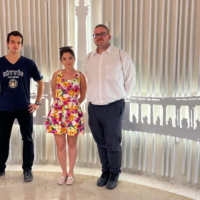The 11th Danube Participation Day was organised in Vienna
Knowledge sharing + Regional development | 21 June 2024
Knowledge sharing + Regional development | 21 June 2024
On June 19, 2024, the Danube Participation Day of EUSDR Priority Area 10 (institutional capacities and cooperation) was organised for the 11th time with the title “Creating change for successful EU enlargement – How can we work together for a sustainable, resilient and stable transition in Ukraine and beyond?” This year, the Austrian capital, more precisely, the Vienna University of Technology, hosted the venue for the event. CESCI was represented by Roland Hesz, senior analyst.
The first panel discussion was titled “Lessons learned from the pathway towards EU accession”. After that, in order to strengthen networking and international cooperation, the DPD gave space and time for direct contacts and discussions between the participants through a so-called Agora where the partners could present their current or future projects, their organisations, special services or their needs.
After the lunch, which also served to build relationships, three workshops took place under the name “Transition Laboratories”. During these sessions, the participants of the conference were divided into three groups of similar size and took turns sharing their knowledge and experience in the three key topics that had already emerged during the online consultation prior to the event: financing, capacity building, and the culture of participatory governance. In all three cases, in addition to the challenges, the participants also discussed possible solutions and good practices. In the following, the participants could listen to presentations in the framework of another panel discussion about financing opportunities, how the Austrian Development Agency, the transnational Danube Region Programme, and the Multi-agency Donor Coordination Platform for Ukraine, created to support the restoration and reconstruction works in Ukraine, are able to serve the sustainable, resilient and green transition in Ukraine (and Moldova) through their support schemes.
There was an agreement that the grants realised with the involvement of the Ukrainian civil sphere could be extended to the encouragement of involvement, which for historical reasons is lagging behind compared to Western Europe, to the participation of civil organisations and the local population in public consultations, to the monitoring of certain municipality and state level plans and investments by local actors (monitoring ), for the formation of relevant policies, open and accessible data and information sources, good European practices and their promotion that can be used. Mentoring, training and capacity development of citizens and their organisations can be of great importance.

 Professional meeting of the Palfi Scholarship Holders
Professional meeting of the Palfi Scholarship Holders